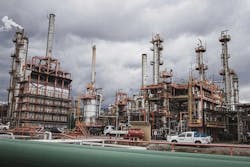YPF progresses refinery modernization program to produce low-sulfur fuel
Yacimentos Petroliferos Fiscales SA (YPF) is progressing an expansion and modernization program to produce low-sulfur fuels at the Luján de Cuyo refinery in Mendoza, Argentina.
At current capacity exceeding 105,000 b/d, the refinery meets nearly all the petroleum derivatives demand of the Argentine market. Increased deliveries of light crude to the refinery from the Neuquén basin following expansions of the Puesto Hernández-Luján de Cuyo and Vaca Muerta Norte pipelines have prompted the site’s proposed capacity expansion.
YPF will install processing modules as part of a new plant at the Luján de Cuyo industrial complex, aligning the refinery with Argentina’s fuel specifications.
Modernization of the complex is expected to increase the production and supply capacity of Infinia Diesel across the country to comply with new fuel specifications, reducing sulfur content in diesel to 10 ppm from 50 ppm.
A hydrogen gas production plant and a diesel hydro-treatment (hydrogenation) unit are also being built. The latter will remove sulfur from fuels, with a production capacity of 3.5 million l. of sulfur-free diesel, reducing CO2 emissions to meet international environmental standards.
Works include installation of new units, modification of existing units, and adjustment of services to supply the installations. Construction of an electrical substation also is under way to help meet emissions reduction plans.
The $600-million project is one of the largest investments at the complex in the last 40 years. Currently 60% complete, the project is expected to be operational next year.
About the Author
Camilo Ciruzzi
South America Correspondent
Ciruzzi is a journalist based in the Argentine province of Río Negro. He has over 30 years of experience in radio and print media. Ciruzzi studied Communication Sciences at the University of Buenos Aires and specialized in energy, political economy, and finance.
